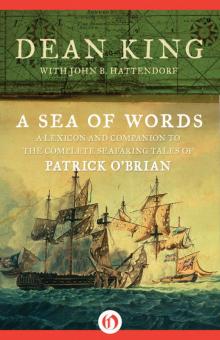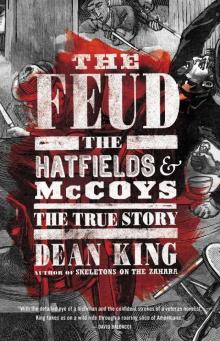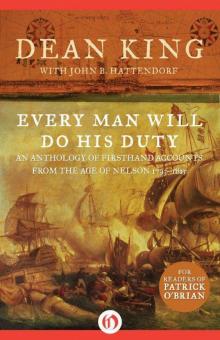Every Man Will Do His Duty Read online
Page 23
Nelson was stationed in the Mediterranean on the Toulon blockade. In early 1805, he chased Villeneuve to the West Indies and back. Napoleon still held out hope of combining the French and Spanish fleets to invade England, but that would end on October 21, 1805, off Cape Trafalgar, Spain.
1 Sir William Edward Parry (1790–1855) searched for the Northwest Passage between 1819 and 1825 and attempted to reach the North Pole via sledge boat from Spitzbergen in 1827.
Part III
The Napoleonic War
William Robinson
The Battle of Trafalgar
1805
WILLIAM ROBINSON VOLUNTEERED for the Royal Navy in May of 1805. Serving on board the newly built HMS Revenge, a 74-gun ship of the line commanded by Captain Robert Moorsom, Robinson quickly learned how to holystone, keep a watch, and drink Scotch coffee (burnt bread boiled in water with sugar). He saw discipline brutally instilled with the cat-o’-nine-tails. “By this regular system of duty,” he later wrote, “I became inured to the roughness and hardships of a sailor’s life. I had made up my mind to be obedient, however irksome to my feelings, and our ship being on the Channel station, I soon began to pick up a knowledge of seamanship,” He would also soon be a battle-hardened man-of-war’s man. On October 21, the Revenge would suffer twenty-eight men killed and fifty-one wounded. This is the first of two passages recounting the events of one of the Royal Navy’s greatest and most tragic days.
AFTER BEATING about the Channel for some time, we were ordered to proceed along the Spanish coast, to look after the combined fleets of France and Spain. Having heard that Sir Robert Calder had fallen in with them a few days previous, we pursued our course, looking in at Ferrol and other ports, until we arrived off Cadiz, where we found they had got safe in. Here we continued to blockade them, until Lord Nelson joined with us with five sail of the line. In order to decoy the enemy out, stratagem was resorted to, and five sail were sent to Gibraltar to victual and water, whilst Lord Nelson, with his five sail, kept out of sight of the enemy, and thus they thought we were only twenty-two sail of the line, whilst their fleet consisted of thirty-three sail. With this superior force they put to sea, with the intention, as we afterwards learned, of taking our fleet; and, if they had succeeded, possessed of so great a force, they were to occupy the Channel, and assist in the invasion of England by the troops then encamped along the French coast, with an immense number of flat-bottomed boats, with which the French ports swarmed; but here, as in many other instances, they reckoned without their host. British valour and seamanship frustrated their design, and destroyed their hopes; for on the memorable 21st of October, 1805, as the day began to dawn, a man at the topmast head called out, “a sail on the starboard bow,” and in two or three minutes more he gave another call, that there was more than one sail, for indeed they looked like a forest of masts rising from the ocean; and, as the morning got light, we could plainly discern them from the deck, and were satisfied it was the enemy, for the admiral began to telegraph to that effect. They saw us, and would gladly have got away when they discovered that we counted twenty-seven sail of the line, but it was too late, situated as they were; hemmed in by Cape Trafalgar on the one side, and not being able to get back to Cadiz on the other.
As the enemy was thus driven to risk a battle, they exhibited a specimen of their naval tactics by forming themselves into a crescent, or half-moon, waiting for our approach; which did not take place until ten minutes of twelve o’clock, so that there was nearly six hours to prepare for battle; while we glided down to them under the influence of a gentle breeze, cheering to every seaman’s heart, that Providence took us in tow; and from a signal made by Lord Nelson, our ships were soon formed into two lines, weather and lee.
DURING THIS TIME each ship was making the usual preparations, such as breaking away the captain and officer’s cabins and sending all the lumber below—the doctors, parson, purser and loblolly men, were also busy, getting the medicine chests and bandages out; and sails prepared for the wounded to be placed on, that they might be dressed in rotation as they were taken down to the after cock-pit. In such a bustling, and it may be said, trying as well as serious time, it is curious to notice the different dispositions of the British sailor. Some would be offering a guinea for a glass of grog, whilst others were making a sort of mutual verbal will, such as, if one of Johnny Crapeau’s shots (a term given to the French), knocks my head off, you will take all my effects; and if you are killed, and I am not, why, I will have yours, and this is generally agreed to. During this momentous preparation, the human mind had ample time for meditation and conjecture, for it was evident that the fate of England rested on this battle; therefore well might Lord Nelson make the signal, “England expects each man will do his duty,”1
Here, if I may be indulged the observation, I will say that, could England but have seen her sons about to attack the enemy on his own coast, within sight of the inhabitants of Spain, with an inferior force, our number of men being not quite twenty thousand, whilst theirs was upwards of thirty thousand; from the zeal which animated every man in the fleet, the bosom of every inhabitant of England would have glowed with an indescribable patriotic pride; for such a number of line-of-battle ships have never met together and engaged, either before or since. As we drew near, we discovered the enemy’s line was formed with a Spanish ship between two French ones, nearly all through their line; as I suppose, to make them fight better; and it must be admitted that the Dons fought as well as the French in that battle; and, if praise was due for seamanship and valour, they were well entitled to an equal share. We now began to hear the enemy’s cannon opening on the Royal Sovereign, commanded by Lord Collingwood, who commenced the action; and, a signal being made by the admiral to some of our senior captains to break the enemy’s line at different points, it fell to our lot to cut off the five stern-most ships; and, while we were running down to them, of course we were favoured with several shots, and some of our men were wounded. Upon being thus pressed, many of our men thought it hard that the firing should be all on one side and became impatient to return the compliment: but our captain had given orders not to fire until we got close in with them, so that all our shots might tell; indeed, these were his words: “We shall want all our shot when we get close in: never mind their firing: when I fire a carronade from the quarterdeck, that will be a signal for you to begin, and I know you will do your duty as Englishmen.” In a few minutes the gun was fired, and our ship bore in and broke the line, but we paid dear for our temerity, as those ships we had thrown into disorder turned round, and made an attempt to board. A Spanish three-decker ran her bowsprit over our poop, with a number of her crew on it, and, in her fore rigging, two or three hundred men were ready to follow; but they caught a Tartar, for their design was discovered, and our marines with their small arms, and the carronades on the poop, loaded with canister shot, swept them off so fast, some into the water and some on the decks, that they were glad to sheer off. While this was going on aft, we were engaged with a French two-deck ship on our starboard side, and on our larboard bow another, so that many of their shots must have struck their own ships and done severe execution. After being engaged about an hour, two other ships fortunately came up, received some of the fire intended for us, and we were now enabled to get at some of the shot-holes between wind and water and plug them up: this is a duty performed by the carpenter and his crew. We were now unable to work the ship, our yards, sails, and masts being disabled, and the braces completely shot away. In this condition we lay by the side of the enemy, firing away, and now and then we received a good raking from them, passing under our stern. This was a busy time with us, for we had not only to endeavour to repair our damage, but to keep to our duty. Often during the battle we could not see for the smoke whether we were firing at a foe or friend, and as to hearing, the noise of the guns had so completely made us deaf, that we were obliged to look only to the motions that were made. In this manner we continued the battle till nearly five o’clock, when
it ceased.
It was shortly after made known by one of our boat’s crew, that Lord Nelson had received a fatal shot: had this news been communicated through the fleet before the conflict was over, what effect it might have had on the hearts of our seamen I know not, for he was adored, and in fighting under him, every man thought himself sure of success; a momentary but naturally melancholy pause among the survivors of our brave crew ensued.
We were now called to clear the decks, and here might be witnessed an awful and interesting scene, for as each officer and seaman would meet (oh! what an opportunity for the Christian and man of feeling to meditate on the casualty of fate in this life), they were inquiring for their mess-mates. Orders were now given to fetch the dead bodies from the after cock-pit, and throw them over-board; these were the bodies of men who were taken down to the doctor during the battle, badly wounded, and who by the time the engagement was ended were dead. Some of these, perhaps, could not have recovered, while others might, had timely assistance been rendered, which was impossible; for the rule is, as order is requisite, that every person shall be dressed in rotation as they are brought down wounded, and in many instances some have bled to death.
The next call was, “all hands to splice the main brace,” which is the giving out a gill of rum to each man, and indeed they much needed it, for they had not ate or drank from breakfast time: we had now a good night’s work before us; all our yards, masts, and sails were sadly cut, indeed the whole of the sails were obliged to be unbent, being rendered completely useless, and by the next morning we were partly jury-rigged: we now began to look for our prizes, as it was coming on to blow hard on the land, and Admiral Collingwood made signals for each ship that was able to take a prize in tow, to prevent them drifting into their own harbour, as they were complete wrecks and unmanageable.
We took an eighty gun Spanish ship in tow for a day and night, but were obliged to cast her off, it blew so hard, and our ship being so very much disabled, indeed we were obliged to scuttle a few of them; some we contrived to take into Gibralter; some were wrecked near Cadiz harbour; and others drifted into the harbour from whence they had only come out two days before. It was a mortifying sight to witness the ships we had fought so hard for, and had taken as prizes, driven by the elements from our possession, with some of our own men on board as prize masters, and it was a great blight to our victorious success; but, in justice to the enemy, it may with truth be recorded, that, however contrary to the Spanish character as an enemy generally, yet, upon this occasion, they used our men well.
In order to shew the crippled state in which our ships must have been, it will be requisite to mention that, in preparing to engage the enemy closely, and protect ourselves as much as possible, the seamen’s hammocks with the bedding and blankets were lashed to the shrouds, which served much to save our rigging, as was very evident from examination on the second night after the battle; for when our men got their hammocks down, many were found to have received a great deal of damage, being very much cut with the large shot, and some were found to have had grape or canister shot lodged in them. The most destructive shot to us appeared to be the thirty-two pounds double-headed; two of these deafeners we observed to be sticking in our main-mast, which, miraculously and fortunately for us, was not carried away.
I will now call the reader’s attention to some occurrences during and after the battle, which, although they may not regularly belong to a seaman’s log, yet they may be found interesting.
AS WE WERE closely engaged throughout the battle, and the shots were playing their pranks pretty freely, grape as well as canister, with single and double headed thunderers all joining in the frolic; what was termed a slaughtering one, came in at one of the lower deck ports, which killed and wounded nearly all at the gun, and amongst them, a very merry little fellow, who was the very life of the ship’s company, for he was ever the mirth of his mess, and on whatever duty he might be ordered, his spirits made light the labour. He was the ship’s cobbler, and withall a very good dancer; so that when any of his messmates would sarve us out a tune, he was sure to trip it on light fantastic toe, and find a step to it. He happened to be stationed at the gun where this messenger of death and destruction entered, and the poor fellow was so completely stunned by the head of another man being knocked against his, that no one doubted but that he was dead. As it is customary to throw overboard those, who, in an engagement are killed outright, the poor cobbler, amongst the rest, was taken to the port-hole to be committed to the deep, without any other ceremony than shoving him through the port: but, just as they were about to let him slip from their hands into the water, the blood began to circulate, and he commenced kicking. Upon this sign of returning life, his shipmates soon hauled the poor snob in again, and, though wonderful to relate, he recovered so speedily, that he actually fought the battle out; and, when he was afterwards joked about it, he would say, “it was well that I learned to dance; for if I had not shown you some of my steps, when you were about to throw me overboard, I should not be here now, but safe enough in Davy Jones’s Locker.”
WHILST WE WERE engaging the combined fleets, a French ship caught fire, the crew of which made every effort to escape from the flames, and as
“Britons fight but to conquer, and conquer to save,”
our frigates and schooners, which had been laying off during the battle, sent their boats to endeavour to save as many lives as possible. Amongst those who were thus preserved from a watery grave was a young French woman, who was brought on board our ship in a state of complete nakedness. Although it was in the heat of the battle, yet she received every assistance which at that time was in our power; and her distress of mind was soothed as well as we could, until the officers got to their chests, from whence they supplied her with needles and thread, to convert sheets into chemises, and curtains from their cots to make somewhat of a gown and other garments, so that by degrees she was made as comfortable as circumstances would admit; for we all tried who would be most kind to her; and as the history of this adventurer may acquire some interest from the account she gave of it, the following is the statement, as collected from herself;—
“The combined fleets, (she says) were ordered to proceed from Cadiz, where they lay, to make an attack and take that of the British; for, from their superior force they were confident of success and elated at the same time with the idea that it would be but an easy task. That no impediment might be in the way, all the females were ordered to go on shore; she was married, and to quit her husband could not endure the thought; she was therefore resolved to share his glory or his death. No time was lost in carrying her plan into execution; for, having rigged herself out in a suit of sailor’s clothes, thus disguised, she entered on board, and went in the same ship with him, as a seaman. In this state she remained, doing duty, during the engagement, when, whilst fighting by the side of her husband, a ball killed him on the spot. On seeing him fall dead, the conflict was too great:—nature displayed itself; she became overwhelmed with grief, and, by it, betrayed her sex.
To add to the distress which this discovery occasioned, an alarm was now spread that the ship was on fire; she seemed to care very little about it; life to her was not desirable, whilst all hands were employed in the endeavour to check the fire’s progress. This seemed to be impossible, and it became necessary to think of the means to escape; for the fire raged with great fury, and there was every probability that, in a few minutes, the ship would be blown into the air, as the fire was fast approaching the magazines.
The resolution to take to the water being now unavoidable, the men commenced to undress themselves; and in this dreadful situation she was strongly urged to do the same, that it was a duty to make every effort for self-preservation, and it being the only chance she could possibly have. After much entreaty, persuasion, and remonstrance, she summoned up sufficient resolution, and prepared herself to endure the agonizing alternative, for the only choice which her unfortunate case presented, was, either to strip or
perish in the flames. She was then lowered into the ocean by a rope from the taffrail, the lead of which was melting at the time, and, whilst letting her down, some of it dropped, and burned the back of her neck. On reaching the water, one of her shipmates, who was a good swimmer, staid by her side, and supported her until she was picked up by a boat belonging to the Pickle schooner, and brought on board the ship she was then in.” [Here let the reader pause, and paint to himself, if he can, what were the inward workings and heartfelt sufferings of this extraordinary heroine, and bright instance of conjugal fidelity and attachment.]
Her name was Jeannette, of French Flanders, and she remained with us until our arrival at Gibralter, when a cartel took her to a Spanish port. On leaving our ship, her heart seemed overwhelmed with gratitude; she shed abundance of tears, and could only now and then, with a deep sigh, exclaim, “les bons Anglois.”
SOME OF OUR MEN were sent on board of the Spanish ship before alluded to, in order to assist at the pumps, for she was much shattered in the hull, between wind and water. The slaughter and havoc our guns had made, rendered the scene of carnage horrid to behold: there were a number of their dead bodies piled up in the hold; many, in a wounded or mutilated state, were found lying amongst them; and those who were so fortunate as to escape our shot were so dejected and crest-fallen that they could not, or would not, work at the pumps, and of course the ship was in a sinking state.
The gale at this time was increasing so rapidly that manning the pumps was of no use, and we were obliged to abandon our prize, taking away with us all our men and as many of the prisoners as we could. On the last boat’s load leaving the ship, the Spaniards who were left on board, appeared on the gangway and ship’s side, displaying their bags of dollars and doubloons, and eagerly offering them as a reward for saving them from the expected and unavoidable wreck; but, however well inclined we were, it was not in our power to rescue them, or it would have been effected without the proffered bribe.

 A Sea of Words
A Sea of Words Skeletons on the Zahara
Skeletons on the Zahara The Feud: The Hatfields and McCoys: The True Story
The Feud: The Hatfields and McCoys: The True Story Every Man Will Do His Duty
Every Man Will Do His Duty 9/11...The Tragic Story of the Day that Changed America: The Terror, The Horror and The Heroes
9/11...The Tragic Story of the Day that Changed America: The Terror, The Horror and The Heroes White Slave Cop
White Slave Cop Skeletons on the Zahara: A True Story of Survival
Skeletons on the Zahara: A True Story of Survival